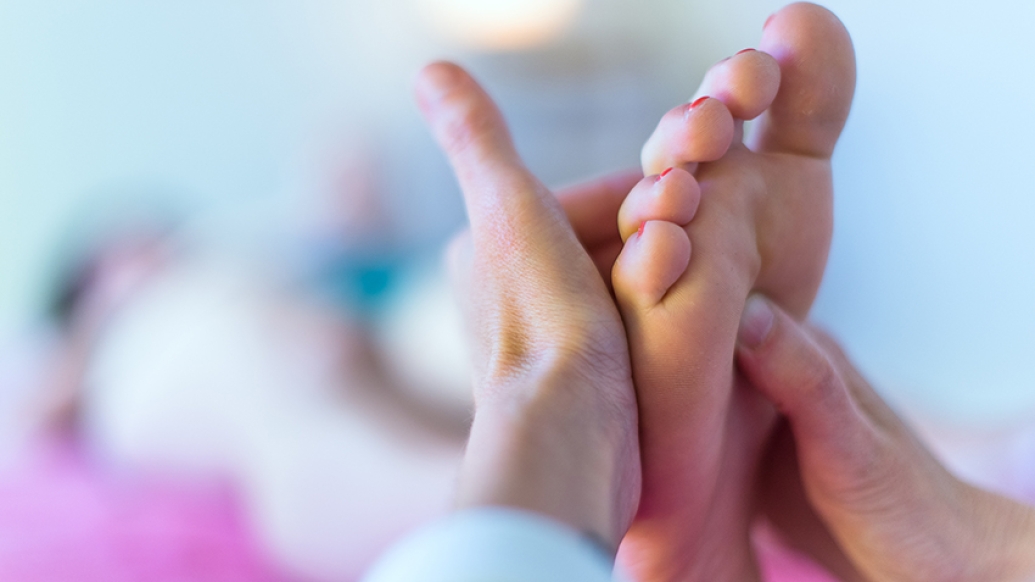Acupressure can help reduce fatigue in breast cancer survivors. A new Michigan Medicine study analyzes how the brain reacts to different types of the therapeutic treatment.
7:00 AM
Author |

Individual acupressure points linked to specific centers in the brain can offer targeted relief for breast cancer patients with persistent fatigue, according to a new neuroimaging study.
MORE FROM THE LAB: Sign up for our weekly newsletter
Researchers at the University of Michigan recently examined the effect of two types of acupressure on fatigue in breast cancer survivors using MRI, the first such study of its kind. The results are published in Frontiers in Neurology.
For many breast cancer patients, treatment and recovery is only the beginning of their cancer journey: Up to one-third of women experience fatigue, sometimes debilitating, for years after treatment ends — a side effect that can impair quality of life, relationships and employment.
Although fatigue is a common symptom with few effective solutions, a 2016 study on the use of acupressure for fatigued breast cancer survivors showed promise. Two-thirds of women achieved normal levels of fatigue after learning to self-administer relaxing acupressure.
Those findings helped inspire the latest research.
"We wanted to see whether different types of acupressure worked differently in the brain," says study author Suzanna Zick, N.D., MPH, associate research professor of family medicine at Michigan Medicine. "What is intriguing about this manuscript is that it shows that the two types of acupressure — stimulating and relaxing — do appear to work via different mechanisms within the brain despite the fact that they both reduced fatigue."
Researchers chose 19 female breast cancer survivors from the Michigan Tumor Registry who had participated in the prior acupressure study at U-M. For this double-blind, randomized trial, nine patients were taught how to self-administer relaxing acupressure (which is traditionally used to treat insomnia), and 10 were taught how to administer stimulating acupressure (which is used to increase energy).
MRI scans were performed at baseline and at the conclusion of the six-week treatment.
"What we were looking at is the connection between the brainstem — a region important in humans and primates that regulates sleep and alertness — and the default mode network, a network of brain regions that is activated when you're thinking about your internal state," says co-author Richard E. Harris, Ph.D., associate professor at the Chronic Pain and Fatigue Research Center at the University of Michigan.
"Previous research has shown that the way these networks connect and interact are very important in the creation of feelings of fatigue, depression and pain."
The power of touch
Both sets of women reported improvements in fatigue levels and quality of sleep after treatment, but MRI scans showed brain network changes in each group that were distinct from each other.
SEE ALSO: Diet Could Help Breast Cancer Survivors Beat Fatigue
Women who were instructed on relaxing acupressure treatments showed an increase in connectivity between the superior colliculus (a brainstem region promoting sleep) and the default mode network.
However, women who were instructed on stimulating acupressure treatments showed an increase in connectivity between the pulvinar (a brainstem region promoting alertness) and the default mode network.
The researchers found merit in both methods: Relaxing acupressure helped improve sleep, while stimulating acupressure improved daytime alertness.
Both methods, they conclude, could improve the perception of fatigue.
"This is the first acupressure imaging study ever, and our results show that different acupressure points do unique things in the brain," says Zick. "Your entire body is not just one acupoint. I was surprised to see the brain imaging difference to be so dramatic even with such a small sample size."
Simple means of relief
One of the benefits of acupressure lies in its simplicity. People can do it for themselves after being trained by a clinician, says Zick.
Breast cancer survivor and study participant Wilma Dixon says it didn't take her long to master the acupressure treatments.
And the effort has paid off: "I do think it made a difference in my quality of life," says Dixon. "I didn't have to give in to my fatigue. I could sit down and work my way out of it."
Dixon also participated in a focus group to design Michigan Medicine's new MeTime Acupressure smartphone app, which uses step-by-step diagrams and videos to walk users through identifying and stimulating acupoints associated with improving feelings of fatigue.
Next, the researchers hope to secure funding to replicate this trial on a larger scale.

Explore a variety of healthcare news & stories by visiting the Health Lab home page for more articles.

Department of Communication at Michigan Medicine
Want top health & research news weekly? Sign up for Health Lab’s newsletters today!





